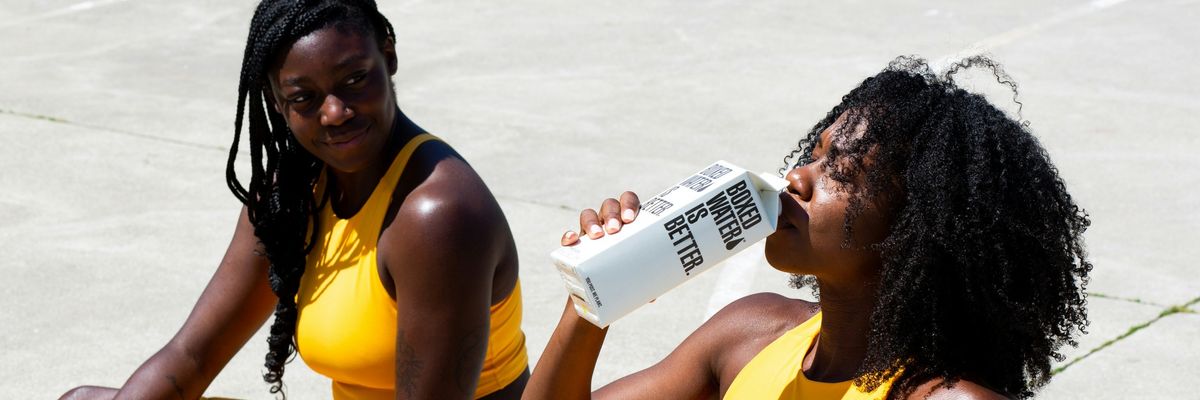These Black Girl Bosses Are Breaking The Mold In The Tech Industry One Code At A Time
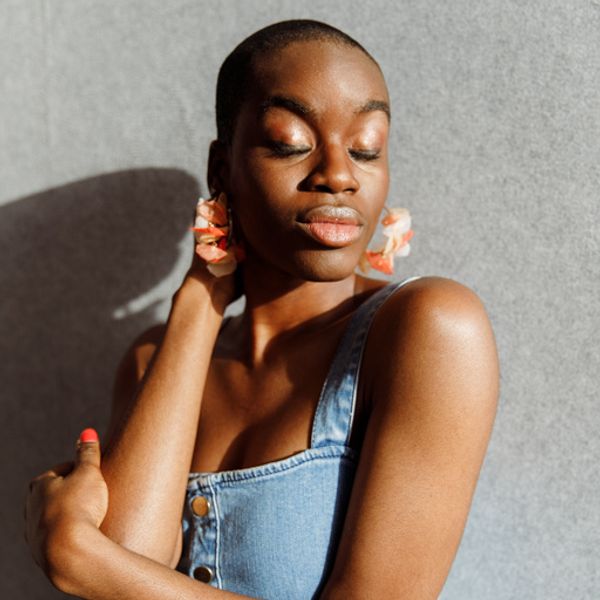
The tech industry is more than just men in hoodies glued to their desks in Silicon Valley. There are also beautiful Black women cracking the code every single day - and slaying while doing it. Each of the Black women included in the list below has created an app, a platform, or a community based upon a need that they've identified or a hole that they sought to fill with their relatability and brilliance.
From food and science to self-love and mental health, Black women in tech are setting positive examples in the STEM field that encourage the confidence of other tech entrepreneurs on the rise.
xoNecole had a chance to speak with these leading Black girl bosses who are sprinkling their #BlackGirlMagic all over the tech industry. Here's what they had to say about their online communities and the importance of diversity and representation in the world of technology.
Carina Glover, CEO of HerHeadquarters

Courtesy of Carina Glover
The platform she created: "HerHeadquarters is a brand partnership platform exclusive to women entrepreneurs. Female founders and entrepreneurs all over the country use HerHeadquarters to quickly secure valuable brand partnerships with other women-owned brands. The platform currently houses 400+ women-owned brands from the fashion, beauty, entertainment, events, and PR industries."
The importance of Black women in tech: "We are the key to creating the products that will positively impact the lives of Black people and women. Until we create the solution, we (and everyone else who falls within the demographic) will continue to live in the problem. Our experiences, perspectives, and culture are unlike those who currently dominate the tech world. They can't develop products that solve problems they've never experienced because they can't relate, therefore they don't see the need for the products. Black women in tech are not a luxury, we're a necessity."
Advice for budding tech entreprenueHERs: "Don't be afraid to take up space. You don't have to be an expert in every area, but learn as much as you can, even outside of your area of focus. Find someone that can mentor you, someone who sees your potential and wants to help water the seed in you."
"Don't be afraid to take up space. You don't have to be an expert in every area, but learn as much as you can, even outside of your area of focus. Find someone that can mentor you, someone who sees your potential and wants to help water the seed in you."
Riana Lynn, Founder of Journey Foods
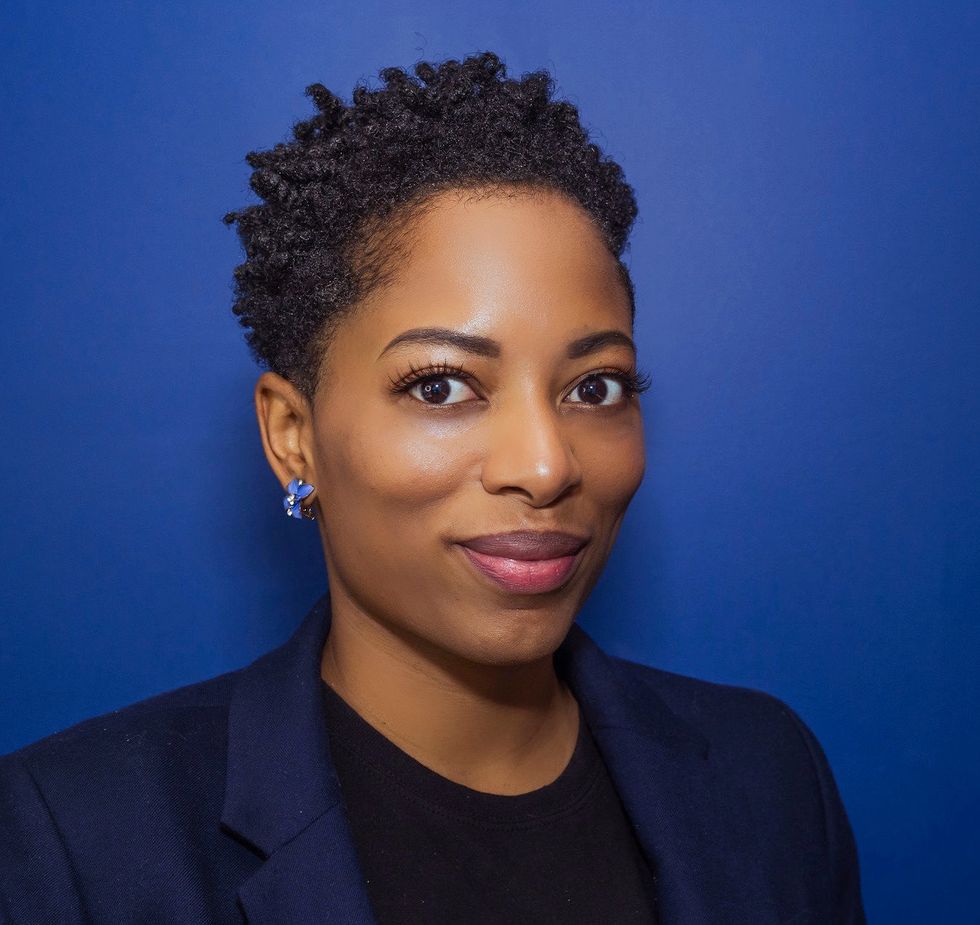
Courtesy of Riana Lynn
The platform she created: "Journey Foods solves food science and supply chain inefficiencies with software in order to help companies feed eight billion people better. [We do this through] technology that improves product management and development for CPG companies, ingredient suppliers, and manufacturers. In addition to helping food manufacturers create better products, we also use the power of our data to create experimental snacks that help us test our AI called Journey Bites. They're nutrient-dense, micro foods that we release for sale online and Amazon."
The inspiration behind her platform: "Globally, consumers spend three trillion [dollars] on packaged foods every year. This number is set to eclipse jump from 700-900 billion in the US by the end of the year. These products, packaged and manufactured foods, account for over 70 percent of our daily caloric intake. At the same time, there's clear evidence that much of the food we eat is related to the increase in chronic diseases - cancer, diabetes, and poor mental health."
The importance of Black women in tech: "As a Black woman, I want to continue to solve problems for myself, family, friends, and communities across the globe. Even though Black women are one of the fastest growing sectors in entrepreneurship, it is a challenging road for the most impactful industries in the world which happen to be dominated by old heads: agriculture and tech. I want to continue to break through on growth, servant leadership, and impact that will help inspire the next crop of Black women that can solve the world's greatest challenges."
Joy Ofodu, Coordinator of #ShareBlackStories
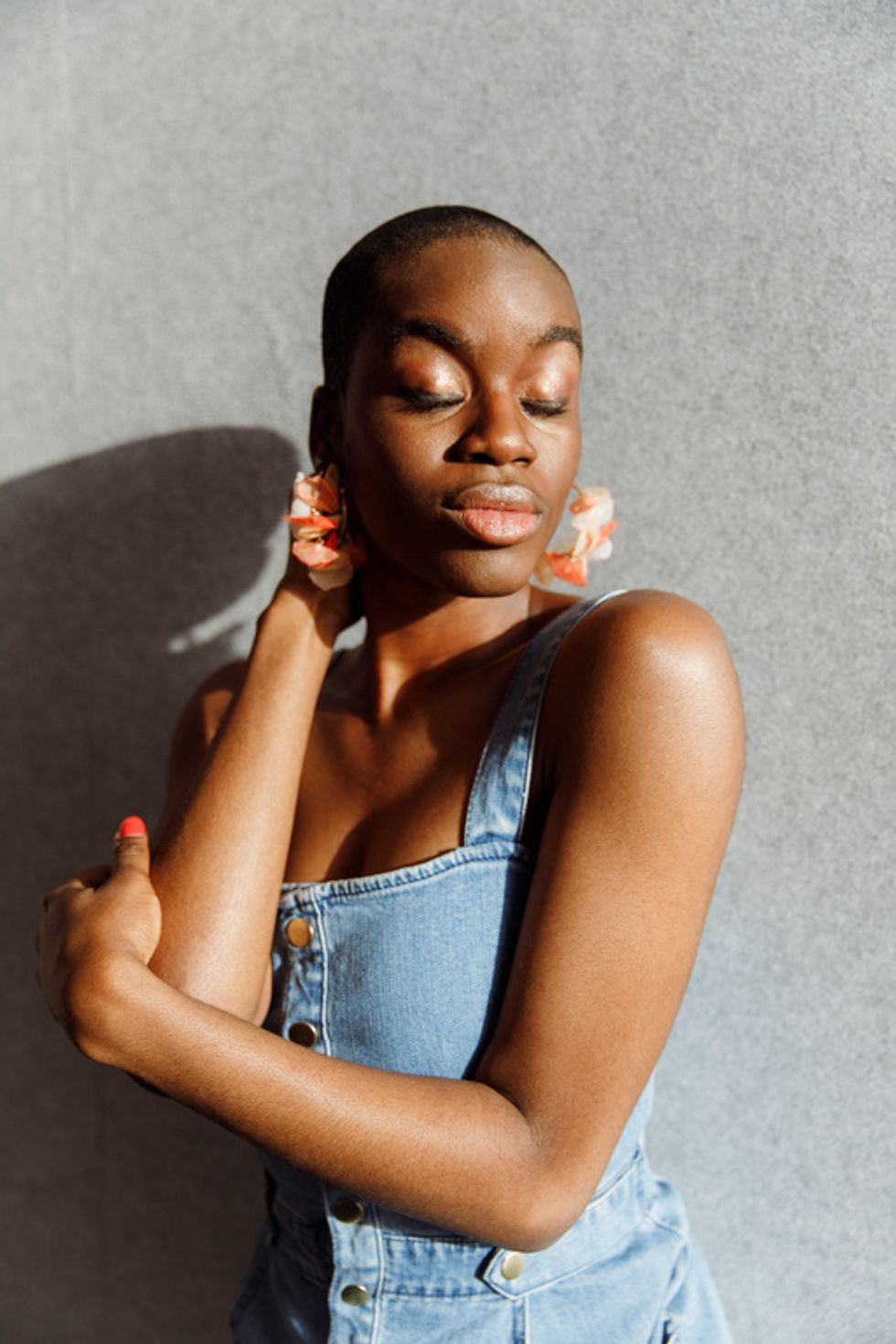
Courtesy of Joy Ofodu
The community for which she leads the brand effort: "#ShareBlackStories, Instagram's first multi-channel program, call to action, and campaign to support and inspire our Black community. Since launching in the U.S. in Feb 2019, #ShareBlackStories has also taken root in the U.K. and Brazil."
The inspiration behind her community: "The U.S. Black community is so active and vibrant on Instagram. We share a sense of pride, perseverance and promote a shared cultural identity that is emulated by so many others. In February 2019, our Black employees were inspired by this and knew it was important to create a space within the app for Black people to fearlessly express themselves. I helped to create a unifying brand identity across our existing efforts, brainstorm new applications, and stepped up to coordinate the efforts of over 11 teams including Editorial, Product, Partnerships, Design and Policy. Since 2019, we've partnered with hundreds of creators, businesses, and public figures to bring #ShareBlackStories to life online and in-person, including Jackie Aina, Jidenna, Ruth Carter, Overbrook Productions, and Afropunk."
The importance of Black women in tech: "When people envision a tech wiz or hacker, they envision a white man from the Silicon Valley. They forget that Black women are expert hackers by nature, some of the most creative problem solvers. Even though Black women make up less than 5% of most major tech company workforces, we play such vital roles in these organizations, both in STEM roles and non-STEM roles, serving as inspiration to other girls. Our presence helps to validate that yes, we are brilliant and deserving of the opportunity to serve a global user base. Sometimes we can't be what we can't see. Finally, when we are represented at the table, we can help make our companies more empathetic to and supportive of Black users."
"Our presence helps to validate that yes, we are brilliant and deserving of the opportunity to serve a global user base. Sometimes we can't be what we can't see. Finally, when we are represented at the table, we can help make our companies more empathetic to and supportive of Black users."
OlanikeeOsi, CEO/Founder of SelfishBabe
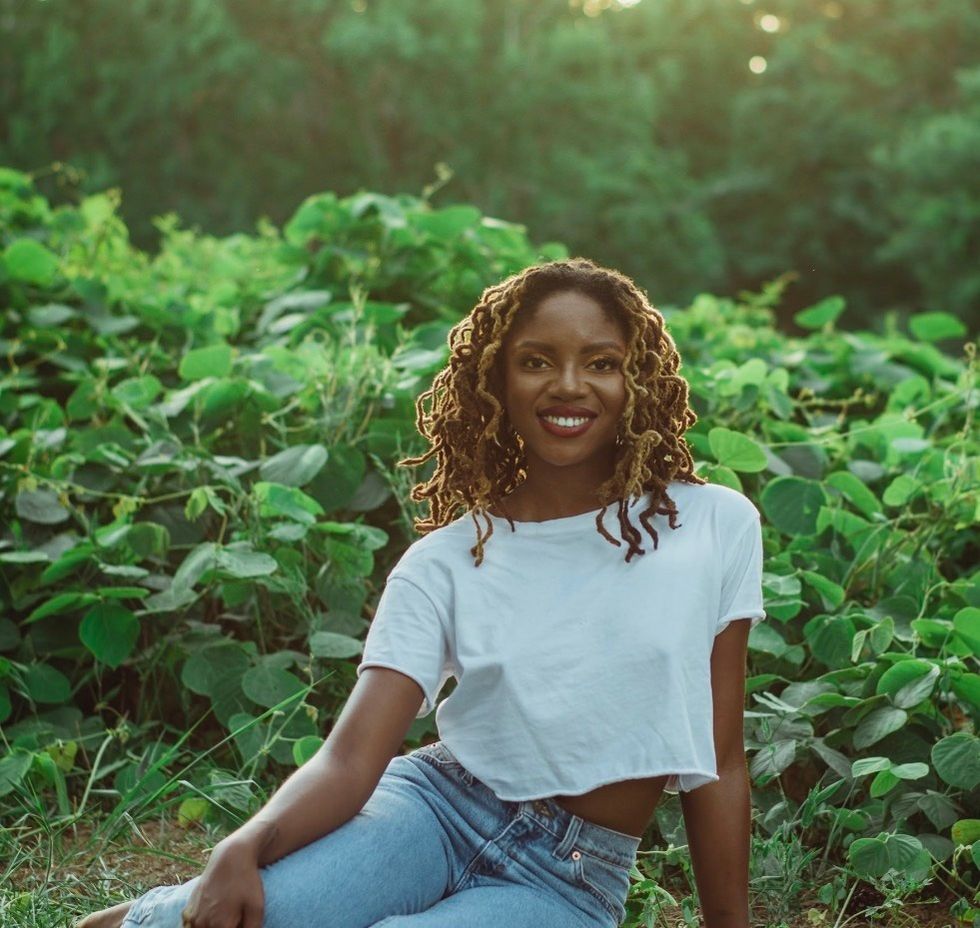
Courtesy of OlanikeeOsi
The app she created: "The SelfishBabe App is my self-love app that sends women a daily affirmation and self-love reminder. SelfishBabe is about women selfishly and authentically loving themselves. Choosing themselves and creating a life they enjoy. It puts self-love at the forefront, really themselves, when usually many women would put themselves at the backseat and put others first."
The inspiration behind her app: "I wanted there to be one place where you could have personal development. A few years back I was big into personal development, learning about spirituality, the law of attraction, crystals, and the power of our words. I had already seen and been inspired by BossBabe and ManifestationBabe. I wanted to change the way we viewed the word selfish. When one thinks of being selfish they usually think about someone who is mean and greedy. With SelfishBabe I just want women to think about them putting themselves first because honestly when it comes to self-love, you are placing yourself first and you're not thinking of anyone else but you, so it is SELFISH but not in the negative way people usually think about it. Being selfish actually helps humanity. Imagine if more women were selfish with themselves where the world would be right now."
Advice for budding tech entreprenueHERs: "My advice would be to be patient, have your vision of what you want your tech to do, how you want it to impact the world, and have a way that it will make money eventually. Have patience because at least in my experience, tech is a long-haul thing. You have to build up visibility about what you have and why it's important and you probably spend a good penny on developing it, without immediate return. This can be frustrating if you don't know this in the beginning and may make you want to quit. Don't quit if you really have the vision for it."
Amanda Spann, Founder of The App Accelerator
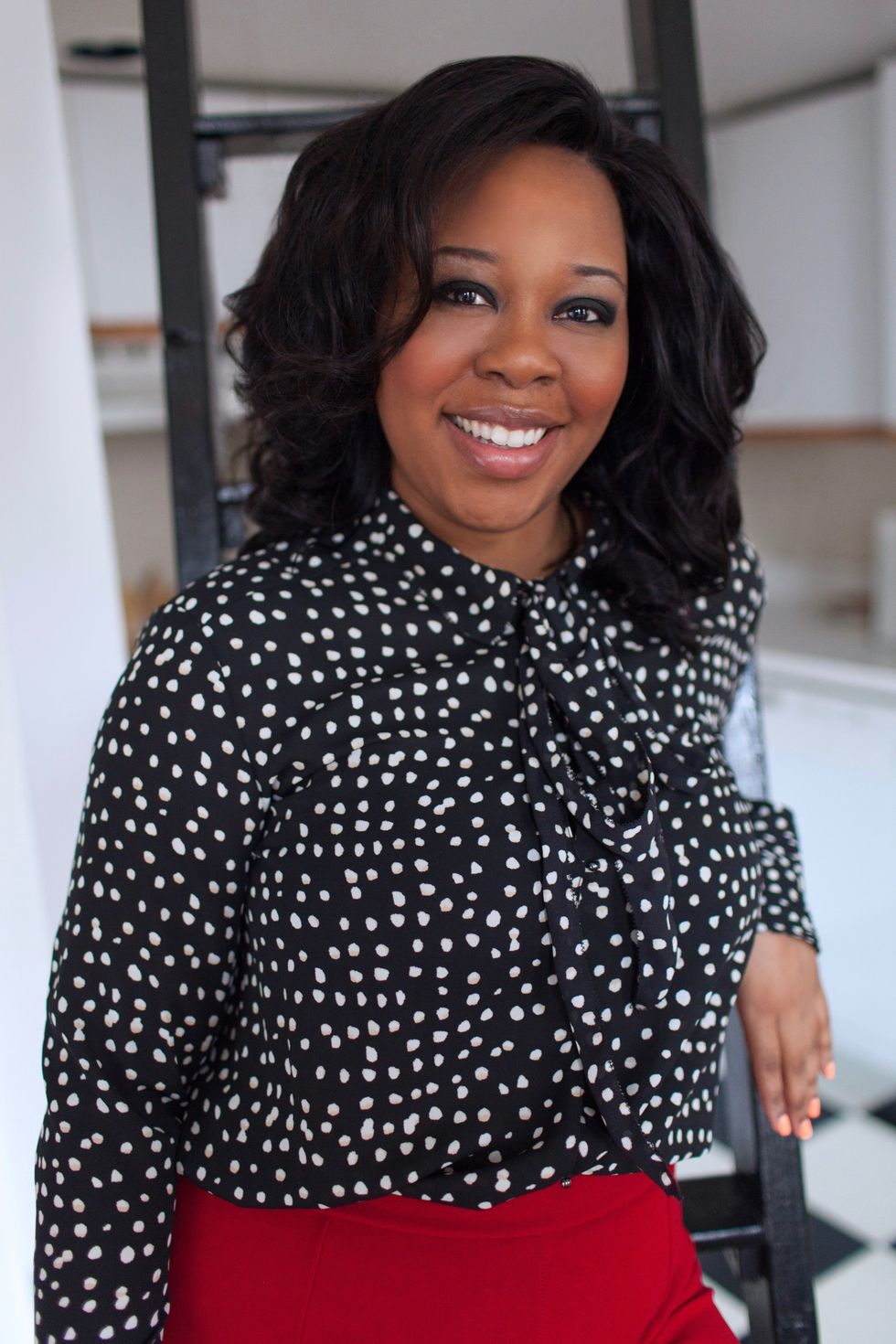
Courtesy of Amanda Spann
The community she created: "The App Accelerator is an online program and community that provides a framework for non-technical and aspiring entrepreneurs to build their first app. We pair our robust curriculum with group and 1:1 coaching and add an additional layer of support with our resource repository to provide you with every asset you need to make your app business a reality."
The inspiration behind her community: "Creating my first app was a long, hard, and lonely process. I blew thousands of dollars and wasted countless hours aimlessly trying to navigate the path from idea to app. Building any product is difficult, but it can be a particularly challenging task when you're non-technical. It can feel like a never-ending trail of Google searches, technical jargon, and a good ol' boys club that you don't necessarily have a membership to. As I was building and some of my apps rose in popularity, I started to receive hundreds of emails from nearly every continent from people who had similar stories, 'Amanda, I have an app idea but I don't know where to start.'
"The App Accelerator was my own 'reply-all' of sorts to each and every one of those messages. I wanted to let people know that everyone has to start somewhere and it's OK to not know what you don't know. Your ideas still hold value and you are capable of building them from anywhere, at nearly any budget. The App Accelerator is my roadmap for making your app ideas happen."
Advice for budding tech entreprenueHERs: "If nothing else, have the audacity to continually show up for yourself, even on the days you don't feel capable, confident or worthy. Give yourself the patience to make mistakes and the grace to keep going."
"If nothing else, have the audacity to continually show up for yourself, even on the days you don't feel capable, confident or worthy. Give yourself the patience to make mistakes and the grace to keep going."
Quincy K. Brown, Ph. D., Co-Founder of blackcomputeHER
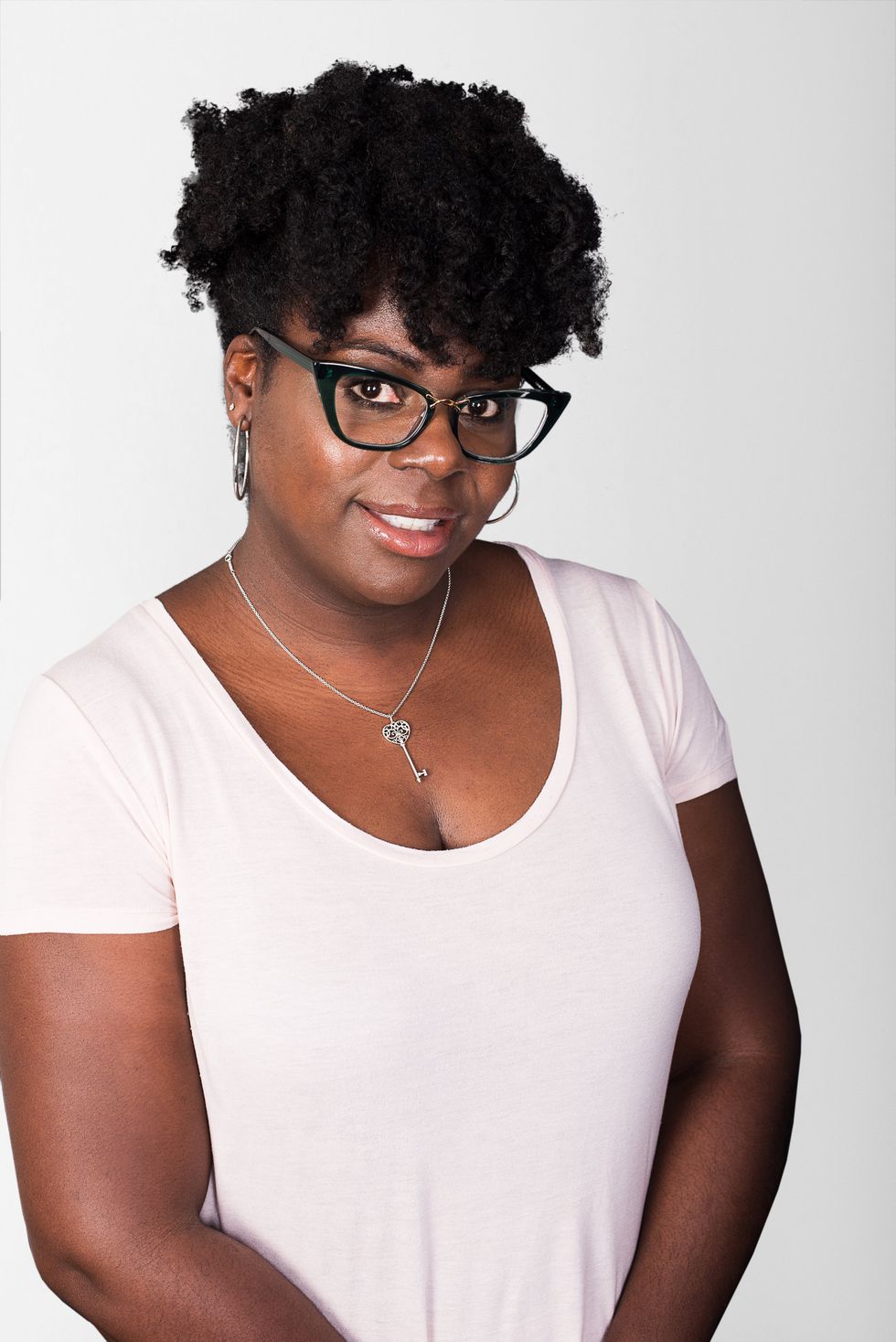
Courtesy of Quincy K. Brown, Ph. D.
The inspiration behind her community: "blackcomputHER.org was born out of the lived experiences of the three co-founders. We each have PhDs in Computer Science and met as graduate students. Throughout our years in graduate school and early in our post-PhD careers, we would see each other at conferences and remark about the small number of Black women with visible roles, e.g. presenters, keynote speakers, committee chairs, etc., in the community. We would often have these conversations at night after the day's conference programming ended.
These became known as the 'Conference after the Conference'. At some point, we realized that our community was dope enough such that for us, the 'Conference after the Conference' really was the conference that we all needed to sustain ourselves, to learn and grow from our experiences, and to be the support for each other that we need.
"We started the conference as a means of organizing the community of Black women in computing and tech by developing an agenda that we can implement and scale. We created the annual #blackcomputeHER conference to be a safe space for us to gather. A time when we can be ourselves, turn off our guards, and have the frank conversations that we know we need. The conference is a gathering for us, not about us, and a time unlike any other when we can speak about our technical expertise and the other topics of importance to us. The organization grew out of this effort as a structure to enable us to do the work."
The importance of Black women in tech: "Representation matters because we matter. Black women in the computing [and] tech world matter. We contribute, we innovate, we create, and we lead at every level. The research literature about Black women and girls in computing [and] tech is scant. The narrative about Black women in tech, who we are, where we come from, what our interests are, what works for us, etc. has not been created by us.
The representation of Black women that is based on 'our' truth is important because it allows us to be free of other people's perceptions of what we can or cannot, should or should not, do or be. The freedom of 'dropping the mask' and just being who we are is not afforded to us, generally, and even less so in tech. Having visible representation that highlights the breadth and depth of who we are and our accomplishments allows us to see ourselves in the space that we have contributed to and created."
Davinia Tomlinson, Founder of rainchq
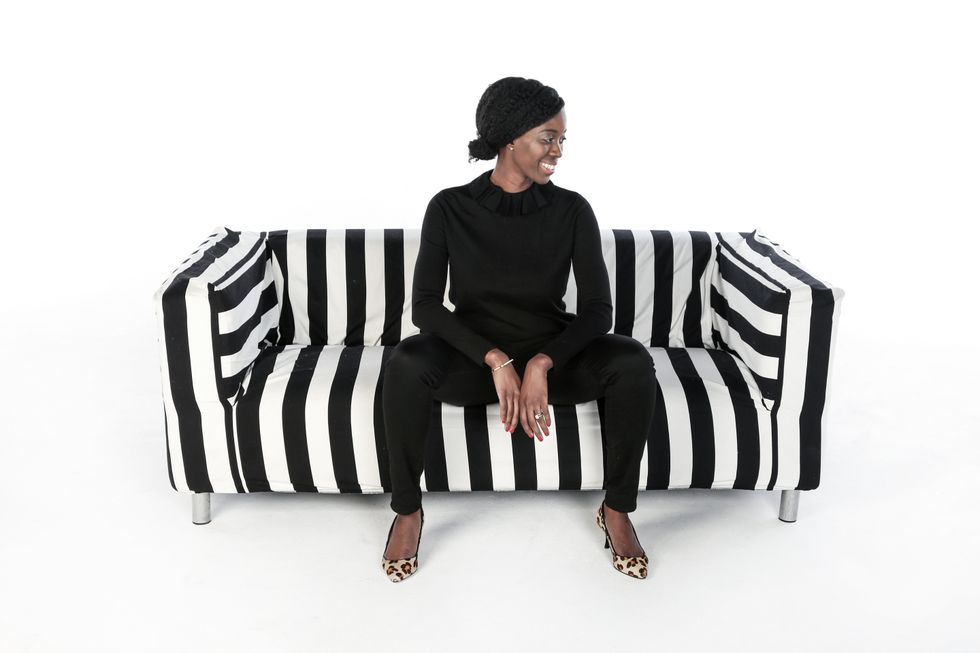
Photo Credit: Simeon Thaw
Courtesy of Davinia Tomlinson
The platform she created: "rainchq is a membership platform created to help women take control of their financial futures. 'Rainmakers' gain access to financial education, qualified and regulated financial advice from female financial advisers and events focused on all aspects of holistic well-being – all delivered digitally."
The inspiration behind her platform: "As someone who has spent my entire career in the world of investment management, it was obvious that women are chronically underrepresented, not just in terms of visibility in senior leadership roles within the industry, but also in terms of the client base. There are a number of different financial challenges women face which have become more prominent in recent years, from the gender pay gap to the gender investing gap, all of which have the potential to cripple us in later life.
rainchq was set up to provide practical solutions to help address this gloomy picture through education, advice, and online community in a mutually supportive and ultimately enriching environment. My ambition is to build a global community of rainmakers who are smashing it, not just professionally but financially too."
The importance of Black women in tech: "I live by the mantra 'if you can't see it, you can't be it', which has become even more important to me as a mother of two young daughters. Black women are trailblazers in whichever field we choose to pursue, however the importance of role models in helping us recognize our capabilities and importantly see what the possibilities are for women who look like us is invaluable."
"Black women are trailblazers in whichever field we choose to pursue, however the importance of role models in helping us recognize our capabilities and importantly see what the possibilities are for women who look like us is invaluable."
Nichelle McCall Browne, Co-Founder of Bramework
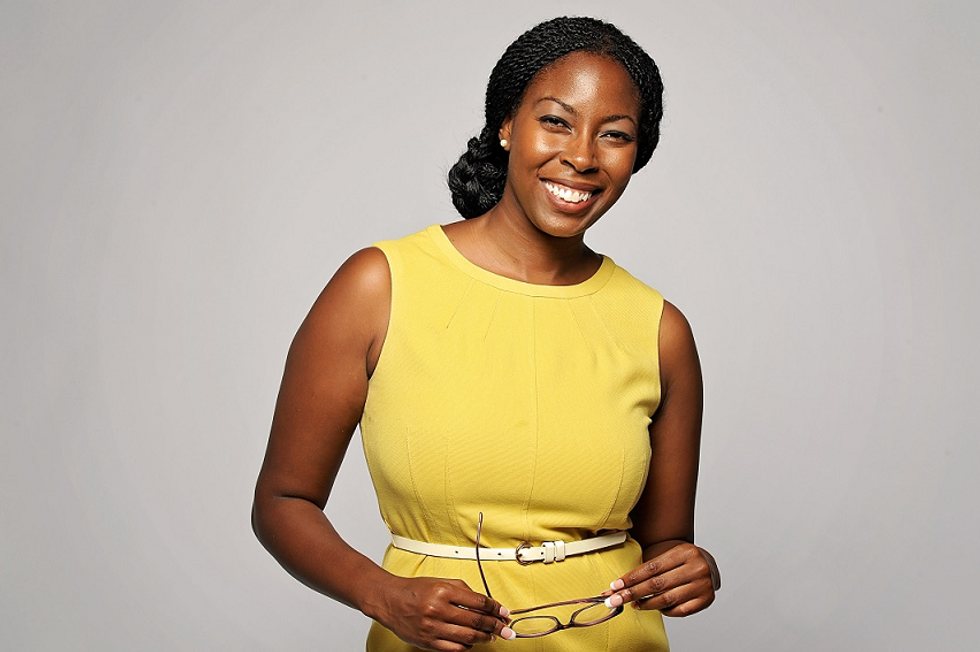
Courtesy of Nichelle McCall Browne
The platform she created: "Bramework is my second tech Startup. I started BOLD Guidance in 2013 to help students apply to college and raised $1/2 million in a year as a non-technical founder (putting me in the .02% of Black women to raise venture capital for a tech company). Now I'm working on my second startup, Bramework, helping small businesses create high-quality blog posts in minutes. Bramework is a marketing department in your pocket.
Helping small businesses that can't afford to hire a specialized team produce blog content regularly so their customers can find them online. When you produce quality content regularly on your website, Google starts to index more pages, which can help you rank higher in search engines. We've found that digital marketing strategists and entrepreneurs love Bramework because they can produce more quality content faster, especially in this current COVID-19 environment where more businesses need to be found online but have limited resources."
The importance of Black women in tech: "Black women bring their own experiences and perspectives, so we see problems, opportunities, and solutions differently. We tap into markets that may be a barrier of entry for others because they don't understand the nuisances of the customer's problems, needs, or how to connect with them. If it wasn't for Black women, there would be no Miss Jessie's, Carol's Daughter, or NaturAll Club. If it wasn't for Black women in tech, there would be no digitalundivided, Blavity, or Travel Noire.
Exposure lets other women see what's possible for them, while being a voice at the table opens up the way for more Black women. It's like when Kimberly Bryant created Black Girls CODE – once women and girls started to see people who look like them and had someone open the doors to opportunities in tech, we saw a huge increase of Black girls being interested in tech. We must continue to open the doors and support each other along the way. We do better when we come up together."
Advice for budding tech entreprenueHERs: "When building your tech company, focus on finding your right paying customer and generating revenue. This is the number one thing I teach entrepreneurs in my courses. Make sure all your milestones and activities point to revenue-generating goals. Don't put too much focus on raising money and what the stats say about Black women raising venture capital. When your number one concern is creating a product that solves your customer's biggest challenge, it's easier to sell it and the money will come. It's always easier to raise money when you have money. But even if it takes longer to raise money, your business is OK because you're making the money that can help you to grow. Plus, you give up less equity when your company is making more."
Featured image courtesy of Joy Ofodu
- This Woman Is Using Tech To Help Families In Need Get Food ... ›
- Amanda Spann Wants More Black Women In The Tech Industry ... ›
- Best Investment Apps 2021 - xoNecole: Women's Interest, Love, Wellness, Beauty ›
- Get Your Mind Right With These Mental Health Apps For Black People - xoNecole: Women's Interest, Love, Wellness, Beauty ›
Your December 2025 Monthly Horoscopes Are All About Surrender & Alignment
December is about letting go. We end the year with the need for more peace, reflection, and rejuvenation, and that is exactly what December is providing for us. The Sun is in Sagittarius, and anything is possible. This is the month to believe in that and to know that the universe is supporting you. With a Supermoon in Gemini as we begin the month as well, we have an opportunity to gain the closure we have been looking for this year and to wrap up old projects, ideas, and communication breakthroughs.
This is the month to make your peace the priority and let go of trying to control the way the tides are turning. Trust in your new beginning, and give yourself time to prepare for it this month.
A big part of the clarity that is coming through this month is due to Neptune going direct in Pisces on December 10, after being retrograde here since July. With Neptune now direct, we are able to see our inspiration and creativity a little more clearly, providing the perfect energy for dreams and manifestation to be built upon. The smoke is clearing, and it’s up to you to decide what you want to do with this newfound clarity that this transit is bringing. Mercury also moves back into Sagittarius on December 11, which is great for communication and clarity, and the adventures you were trying to see through at the beginning of November come around for you again with greater purpose and support.
On December 15, Mars enters Capricorn until the end of January 2026, and this is the extra push we need to make important changes and to be on the path towards greater abundance, stability, and prosperity. Mars in Capricorn takes care of business, and we have extra energy at our disposal during this time to do so. This transit is an ideal time to focus on your career or financial goals for next year and to start putting some of these plans into motion now. A few days later, we have the New Moon of the month, which will be in Sagittarius on December 19, and this is the perfect New Moon to manifest.
The energy is high, magic is in the air, and it’s all about moving forward with the new beginnings that are inspiring you and bringing you joy to think about right now.
Capricorn Season officially begins on December 21, and this earth sign energy is how we heal, gain closure, and build new foundations in our world. With Venus also moving into a Capricorn a few days later, there is something about peace, prosperity, and security that we are gaining in life and in love as we close out the year, and this is what we need right now. This month is about reflecting on what was, letting go of old hurt, and renewing. December is an ending and a new beginning in one, and there is magic in this space to be created.
Read for your sun and rising sign below to see what December 2025 has in store for you.
 AriesKyra Jay for xoNecole
AriesKyra Jay for xoNecoleARIES
December is a full-circle moment for you, Aries. You are seeing the gifts in your world and have a lot of gratitude for the way things have come about for you as of late. There are culminations in your world that are providing you with more abundance, stability, and community, and you are exactly where you are meant to be this month. With the Sun in a fellow fire sign and in your 9th house of travel for most of the month, December is a good time to get out of your comfort zone, explore the world around you, and get your body moving.
Mars, your ruling planet, also makes a change and moves into Capricorn on December 15, which will fuel your inspiration and power in your career space. You are making a lot of professional progress as we close out the year; however, make sure to be more mindful of your competitive drive right now. The New Moon on December 19 is the perfect opportunity for you to create some new plans and goals when it comes to traveling, education, and where you want to gain some new inspiration in your world. Overall, this is a month of things coming together for you serendipitously.
 TaurusKyra Jay for xoNecole
TaurusKyra Jay for xoNecoleTAURUS
December is about trusting your intuition, Taurus. You have a lot on your mind this month, and it’s best to delegate, communicate, and allow yourself some relief by opening up to someone and not feeling like you have to hold everything in. As we begin the month, we have a Supermoon in Gemini happening in your house of income, and the plans and projects you have been building here come to fruition for you now. This is the time to gain clarity on your financial world and to take a look at what spending habits you want to let go of here as well.
With Venus in your 8th house of shared resources for most of the month, you are doing a cleanse on your commitments, partnerships, and business ventures. You are taking a look at what you want to dedicate yourself to in the future, and what commitments you may need to let go of now in order to be in the space you truly want to be, both financially and within some of your relationship dynamics. Before we end the month, we have a New Moon in this same area of your chart, and it’s time to look at the opportunities that are presenting themselves and to trust your internal guidance system to lead you forward.
 GeminiKyra Jay for xoNecole
GeminiKyra Jay for xoNecoleGEMINI
You are moving forward fearlessly this month, Gemini. December is your month of love, passion, and dignity, and you are owning the light that you shine. We begin the month with the last Supermoon of the year, happening in your sign, and you are stepping up to the plate. You are showing up, owning how much you have grown this year, and allowing yourself to heal while also acknowledging that you have done your best and you deserve to have fun in the midst of the changes you are creating.
Mercury, your ruling planet, is officially out of retrograde, and you can use this energy to the fullest potential now. With Mercury in your 7th house of love, it’s time to speak from the heart and to talk about the things that matter and that are inspiring you right now to your loved ones. You never know what kind of epiphanies you may have when you open up the conversation to others. Before the month ends, you have a New Moon in this same love area of your chart, and this New Moon is all about manifesting romance, commitment, and abundance in your world.
 CancerKyra Jay for xoNecole
CancerKyra Jay for xoNecoleCANCER
December is an opening for more love, more joy, and more freedom in your life, Cancer. You have come to a place where you hold so much gratitude in your heart for where you are today and where your heart is shining, and things come together for you with more ease right now. With the Sun in your 6th house of health, work, and daily routines for most of the month, you are getting your ducks in a row while also putting more energy and effort into taking care of yourself, your priorities, and your well-being. This month surprises you in many ways, and it’s because you are showing up.
Mars and Venus both move into your house of love, relationships, marriage, and abundance this month, and you are making strides in your love life. You have both of these opposing forces on your side and are being recognized for the love you are while also receiving the love you want. This month, overall, is about focusing more on the positives in your world and letting your heart have its joy. Before December comes to an end, there is a New Moon in Sagittarius, and this is the perfect opportunity to create the plans you want to see through next year, especially when it comes to your work life, colleagues, business ventures, and health.
 LeoKyra Jay for xoNecole
LeoKyra Jay for xoNecoleLEO
The scales of karma are balancing, and they are balancing in your favor this month, Leo. December is your month of truth, and of seeing it clearly in your world. The Sun is in your house of romance, pleasure, and happiness for most of the month, and it’s time to relax, be in the present moment, and allow what is meant to be, to be. With a Supermoon in your 11th house of manifestation as December begins, this is a powerful month for seeing your dreams come to fruition, and for feeling like the intentions you have set this year are finally here for you now.
Mars also moves into your 6th house mid-month, and this is the perfect energy to have to move into the new year. You have extra energy at your disposal right now and are feeling fearless with what is possible for you and your daily routine. Before the month ends, we also have a New Moon in a fellow fire sign, Sagittarius, and this is a breakthrough moment for you and your heart. December, overall, wants to show you how loved and supported you are and will be doing so in magical, unexpected, and concrete ways.
 VirgoKyra Jay for xoNecole
VirgoKyra Jay for xoNecoleVIRGO
December is a month of victory, Virgo. You are showing up and experiencing some new successes in your world that move you forward on your path in life. With a Supermoon in your 10th house of career as we begin the month, the effort and intentions you have made this year come into full bloom, and you are being recognized for who you are and the good work you have done. This month is all about showing up and allowing yourself to be seen and loved, knowing that you deserve the support and opportunities you are receiving.
Mars moves into Capricorn on December 15, which brings the passion and excitement into your love life, hobbies, and little pleasures in life that light you up. You want to have fun this month and are going to be walking into the new year with this fearless, happy, and spontaneous energy within you. Before the month ends, Venus also enters Capricorn, and in this same area of your chart, you have a lot to look forward to and believe in right now. Overall, December wants you to be happy and will be doing everything possible to make that happen for you. This is your month to shine, Virgo.
 LibraKyra Jay for xoNecole
LibraKyra Jay for xoNecoleLIBRA
December is a month of opportunity for you, Libra. New doors open, and you are financially making breakthroughs this month because of it. December begins with a Supermoon in your 9th house, and you are getting a clearer view of where you have been making strides in your life and how it has all brought you here to this present moment of freedom. This month is showing you what happens when you are fearless with your purpose and when you believe in yourself and what you are worthy of.
Moving further into December, Mars moves into your 4th house of home and family mid-month, and you are closing out the year in your safe spaces. You are spending more time with your loved ones and taking the time to quiet your mind and listen to what your heart has been telling you. Before the month ends, we have a New Moon in Sagittarius, happening in an area of your life that deals with communication. This is a great time for getting the answers you have been looking for and for feeling more clear-headed and confident about the decisions you are making as you move into the new year.
 ScorpioKyra Jay for xoNecole
ScorpioKyra Jay for xoNecoleSCORPIO
Patience is a virtue this month, Scorpio. December is all about remaining patient and vigilant with what you are creating in your world, and knowing that the universe has your back. It’s time to be reminded of the power of hope, and this month is an opening to greater clarity in your life. There is a lot of energy in your financial zones right now, and this is providing you with new opportunities and new insight; however, the speed at which things come about for you may feel daunting. Keep your head up and eyes focused on what you want and know that you are more than worthy of receiving it.
With Mercury in your 2nd house of income this month, December is a good time to plant new seeds and to think about where you want to be financially a month from now or even a year. This month is asking you to think bigger and to think more long-term so that you can set the appropriate plans into motion now. We also have a New Moon in your house of income before the month ends, and this is when you will see more of your dreams come to fruition in this area of your life, and have more opportunities to build. Overall, December will be teaching you a lot, Scorpio.
 SagittariusKyra Jay for xoNecole
SagittariusKyra Jay for xoNecoleSAGITTARIUS
Sagittarius Season is here, and there is a lot in store for you this month, Sag. December is all about what you are dedicating yourself to. It’s about setting your intentions and putting the work in to back up your dreams, and about getting things in order so that when the new beginnings come, you are ready for them. The Sun and Venus are in your sign for most of this month, and there are a lot of eyes on you right now. You have the potential to create a new beginning for yourself, and it’s time to invest in yourself, your love life, and your dreams.
Mercury moves into Sagittarius on December 11, and this is giving you another opportunity to see through some of the plans that you had initiated in November. Mercury was retrograde in your sign last month, and there may have been some disruptions to your vision and plans for the future, and now this energy is turning around for you. Before the month ends, we also have a New Moon in Sagittarius, and you are walking through new doors fearlessly. You are catching others by surprise by your growth this month, and you are thinking a lot about your purpose, future, and plans for the new year.
 CapricornKyra Jay for xoNecole
CapricornKyra Jay for xoNecoleCAPRICORN
December is all about the vision, Capricorn. You are moving through a lot of changes and transformations this month, yet they are giving you a chance at a new beginning in the process. You are focused more on the future and what goals you want to manifest for yourself right now, and are ready to let go of what hasn’t been working for you. With the Sun in your 12th house of closure for most of December, this is your time for healing, but remember, healing doesn’t have to be isolating or boring; you can thrive while you renew, and you are this month.
Mid-month, the excitement picks up for you, and you are feeling more energized than you have in a while. Mars moves into Capricorn until the end of January 2026, and you are being proactive with your goals, intentions, and passions. You are a force to be reckoned with this month, and you are making things happen for yourself with confidence. Capricorn Season officially begins on December 21 this year, and this is definitely speeding up your healing process. You are breaking free from what was, and with Venus also moving into Capricorn before the month ends, you are leaving this year in high spirits and with love opening a new door for you.
 AquariusKyra Jay for xoNecole
AquariusKyra Jay for xoNecoleAQUARIUS
December is all about community, creativity, and manifestation, Aquarius. This is the month to work together with others to help bring your dreams to life. You are in a space of inspiration, empowerment, and beauty, and are creating more of this energy around you and in your world. Look out for what support comes your way this month and know that you don’t have to do everything alone to succeed. With the Sun in your 11th house of manifestation and friendship, your intentions are coming to fruition, and it’s time to celebrate with the people you love and to own how far you have come this year.
On December 19, we have a New Moon in Sagittarius, lighting up your life in all of the best ways possible. This is your New Moon of freedom, victory, and magic, and you are seeing new beginnings appear that you were once just hoping for. Before the month comes to an end, Venus moves into your 12th house of closure, and after an active and successful month, you are ready to relax, heal, and give your heart some of the attention it has been asking for. You are moving into the new year with the need to release and renew what hasn’t been working in your relationships, and you are finally ready to.
 PiscesKyra Jay for xoNecole
PiscesKyra Jay for xoNecolePISCES
December is a big month for you, Pisces. You are making some huge accomplishments this month, and are feeling like everything you have been through this year has been worth it for these moments that are coming to fruition for you now. The Sun is in your 10th house of career and reputation for most of the month, and this is where a lot of your focus is right now. You are claiming your successes and putting yourself out there in ways that not only serve you, but that inspire others as well.
Neptune officially goes direct on December 10, after being retrograde in your sign since July, and you are finally seeing things a little more clearly. You are feeling renewed inspiration and passion in your life, and your intuition is your strongest asset right now. Before December comes to an end, we also have a New Moon in your 10th house of career, and what happens now not only changes things for you in the present, but it also opens new doors and what is possible for you in the new year as well. Overall, you are on top of your game this month and are owning the joy and empowerment you feel.
Featured image by Kyra Jay for xoNecole
I wish I enjoyed drinking plain ole’ water. I don’t, though, and, at this point, I doubt that I ever will. It’s not something that I’m proud of or anything, but like I’ve said in other articles on this platform, to me, water is so damn boring; it’s literally like drinking “wet air.”
That doesn’t mean I don’t accept that it’s a “necessary evil” being that we all are made up of so much water and being dehydrated (which is something that a lot of us are) can cause so many health-related issues, including blurred vision, muscle cramps, dried skin, fatigue and even moodiness.
That’s why, over the years, I’ve been intentional about figuring out ways to get more agua into my body without feeling like it’s a chore or something to dread. And now, I want to pass some of those hacks on to you, just in case you happen to totally relate to where I am coming from.
If something that you want to do more of right through here is get extra H2O into your system, here are 10 tips that can absolutely help to make that possible.
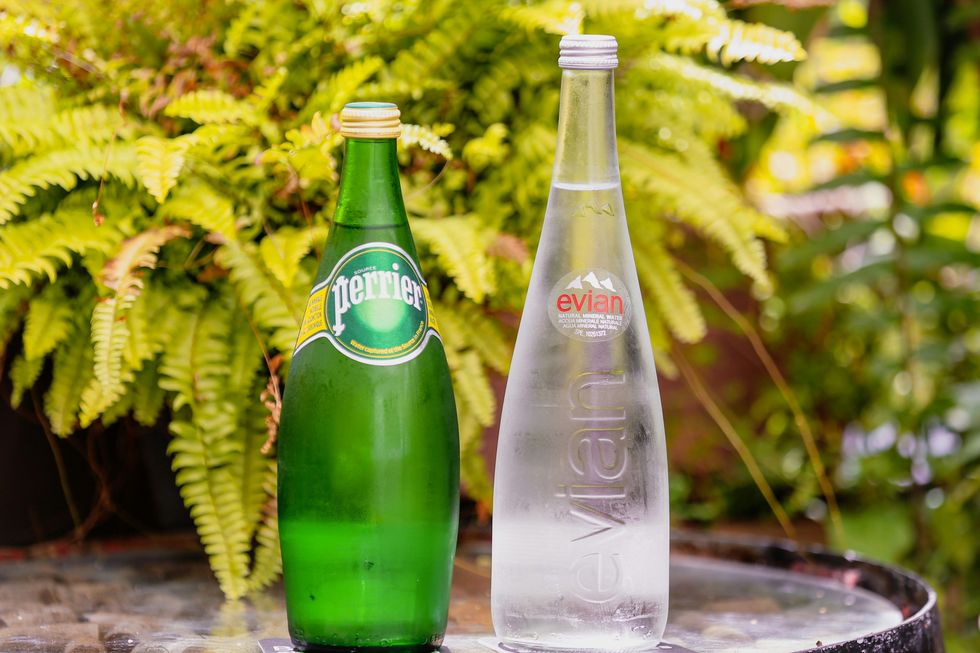
Unsplash
1. Invest in a Fun Water Bottle
There’s a far greater chance that you are going to drink water if you have a water bottle around you. So, cop yourself a cute one — one that will help you to stay motivated. A tumbler that I purchased some time back, just because I thought it was cute as hell, simply says, “Make Better Coochie Decisions” (amen?-LOL). Honestly, that doesn’t just have to apply to sex but how you treat your vagina overall — and that includes making sure that “she” has all of the fluids that she needs.
2. Try Some Sparkling Water or Mineral Water
At this point, I should take stock in Waterloo. It currently is my favorite kind of sparkling water and it has definitely made getting more water into my system easier to do. That’s because I will add some limes to it or a bit of fruit juice to it and that makes drinking water less “meh” for me. Another type of water that has bubbles in it is sparkling mineral water; it can also be beneficial since it contains magnesium, potassium and calcium.

Unsplash
3. Go Halfsies with Your Other Drinks of Choice
Speaking of making some all-natural soda (which is basically what happens when you add juice to sparkling water or sparkling mineral water), you can find yourself drinking more water while consuming less calories if you fill up your glass with half of your favorite fruit juice and half of some sparkling water. More times than not, the juice doesn’t even taste watered down. Try it before you doubt me.
4. Collect Some Infused Water Recipes
I’m forever gonna be a fan of infused water; that’s because it’s water that has fresh fruits and/or veggies in them — and it doesn’t get any healthier than that. Plus, infused water tends to take on the taste of whatever fruits or vegetables that you put into the water (if you let the stuff soak for a couple of hours), so that the water doesn’t taste so boring and bland. Wanna try a few recipes? You can check out some here and here.

Unsplash
5. Make Slushies Instead of Smoothies
Are you someone who enjoys consuming smoothies? Well, if you want to get more water into your system, how about going with a slushie instead? Although it is true that some smoothies have water as a base, the most bomb ones use milk (or a milk alternative) or yogurt. Slushies, on the other hand, typically go with crushed ice (which is frozen water) instead. That said, some (pardon the pun) cool slushy recipes can be found here, here and here.
6. Use Water As Your “Drink Chaser”
Another great thing about water is it can help to keep you from overeating; it does that by causing you to feel full if you drink it while you are eating. And speaking of calorie-counting, if you don’t want to give up your favorite drink at mealtime, one way to keep from downing 2-3 glasses of it at a time is to use water as your “chaser.” What I mean by that is, after enjoying a glass of your favorite beverage, “chase it down” with a glass of water. That should satisfy your want for what you want without overdoing it.
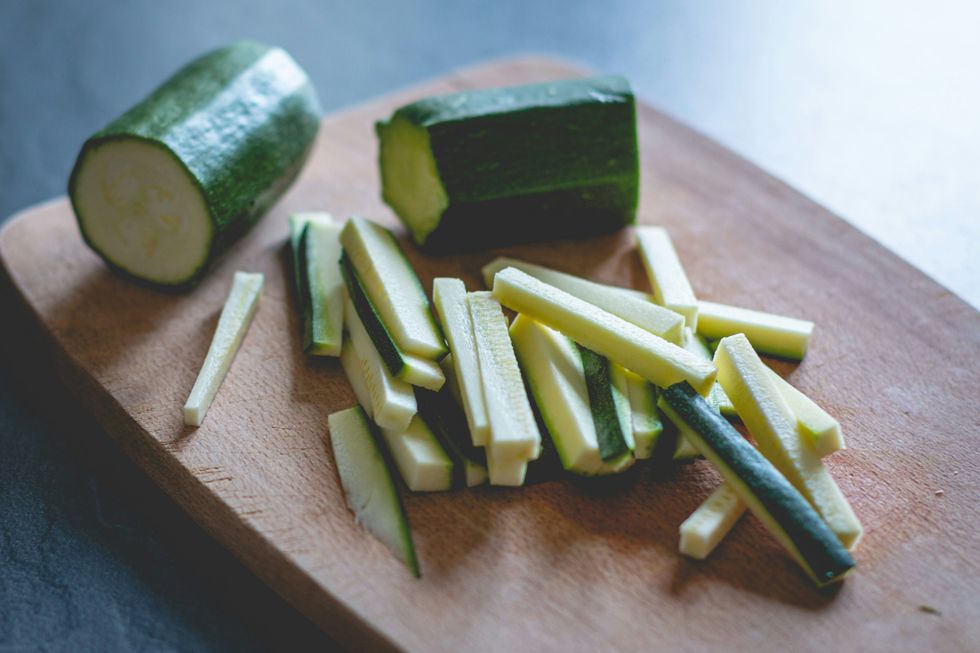
Unsplash
7. Eat Foods That Are High in Water Content
Another way to get more water into your body is to eat foods that have a ton of water in them. Some that top the list include lettuce (96 percent); cucumber (95 percent); zucchini (95 percent); celery (95 percent); strawberries (91 percent); cantaloupe (90 percent), and peaches (89 percent).
8. Have a Ball with Your Ice Cubes
Ice cubes are frozen water, right? That’s why most of us prefer to enjoy our drinks before the ice cubes melt because melted cubes water down whatever it is that we are consuming. And so, for this very reason, add more ice cubes to your drinks — and have fun making them. You can add juice, fruit and/or mint leaves while making your cubes. That way, they are aesthetically-pleasing; plus, they will also add more flavor to your water once the ice cubes actually melt.

Unsplash
9. Add Some Non-Alcohol Cordial to Your Water
If you’re fine with just having a tad of taste in your water, why not add a bit of cordial to it? Cordial is simply a type of tonic, syrup or sweetener (that can contain alcohol or not) that can help to make your water more…interesting. Some alcohol-based cordials can be found here. Some non-alcoholic recipes are located here.
10. Technically, Herbal Tea Counts
Tea is always gonna be my thing. That’s why I’ve penned articles on it for the site like “10 Different Ways Herbal Teas Can Fit Into Your Beauty Regimen”, “10 'Uncommon' Teas You Should Add To Your Stash (& Why)” and “I've Got 10 Teas That Will Help You To Age (Even More) Gracefully” And y’all, if you want to get a lot more water into your system yet a tall glass of water only isn’t your — pardon the pun — cup of tea, make some iced herbal tea instead.
It’s basically water with some herbs tossed in and, if you add some honey or raw organic coconut palm sugar to it, it will be a really sweet treat that will still be extremely hydrating (and very healthy) for you.
Water that is a bit more exciting for you…now. LOL.
Drink up!
Let’s make things inbox official! Sign up for the xoNecole newsletter for love, wellness, career, and exclusive content delivered straight to your inbox.
Featured image by Unsplash









